It was the sound of a baby crying that relieved the tedium of Deng Xiaoming's life.
This fifty-year-old peasant-worker leads a vagrant life on the streets of Chengdu. While roaming the streets around midnight, he came across the baby, hidden in thick grass.
The worker, living at the lowest level of society, had long suffered from neglect. The vulnerable baby had just been abandoned. However, together they lit a match of warmth in the dark night.
The baby, who had just come into world, had nothing but his breath. When Deng found him he was naked, his umbilical cord still attached, with maggots in his ears.
Deng had little more than the baby – just a few items of dirty clothing and a sack stamped with the words " Good man". He was out of work, and his mobile phone had been stolen. He had come to Chengdu two weeks earlier to apply for a job. He had been reduced to living off a daily bowl of rice porridge, which he bought for 1 yuan.
But this man, who in the eyes of many would appear to be the lowest of the low, could still show mercy to a creature in need.
When a journalist asked Deng why he had saved the infant, he gave an answer that appeared to be puzzling: "Because I had run out of money." But the logic behind his answer was apparent. He menat that if he had had money, then he wouldn't have been sleeping in the streets. If he had not been sleeping in the streets, he wouldn't have had to get up in the night to find relief from the nuisance of mosquitos. It was because of this that he came upon the baby. Otherwise it would have died. According to his simple logic, his lack of money was a blessing.
In a city of wealth, there are many who are poor – their faces weather-beaten, their hair thinning, people who look like they have not had a bath for days. They aspire to no more than a simple job, enough to eat, and a little money to see them through their old age.
That morning, Deng put aside his hopes for the future. Holding his breath, Deng searched for the crying baby in the dim light. When he found it, he immediately took his own clothes off and wrapped them round the baby. Mindful of his dirty hands which might cause infection, when he cut off the umbilical cord he left a short length.
In the hospital, doctors and nurses cut the infant's umbilical cord properly, bathed it, and nursed it, while Deng sat up all night outside the ward. Once it had been cleaned up, the baby could be seen as it truly was - plump with big eyes, and a single-fold eyelid. "I don't know how a mother could abandon such a cute baby," said Deng.
A security camera near the spot where the baby had been left didn't record who had abandoned him. Perhaps, to the person responsible, the baby was a voiceless creature with no dignity. Perhaps she is relieved at having rid herself of a burden she was unwilling to bear. An indifference to life can sometimes confer a sense of freedom.
But this fragile life, which would certainly have died, was fortunate to be found by another powerless individual, himself workless and hungry. The encounter changed both their lives.
The infant was safe, but the exhausted Deng was reluctant to leave. "When the police arrive and I'm sure of the baby's safety, then I'll feel better," said Deng. Standing in the corridor waiting for the police, he put aside thoughts about his own plight, his need to find a job, his need to make a living.
Even poverty and hunger weigh little in comparison with a life. Even Deng's hardships pale into insignificance in comparison to the problems of the abandoned baby.
When he brought the baby to the hospital, Deng's clothes were stained with blood. The doctors gave him a green surgical gown. The next day he appeared in the job market, wearing the odd and ill-fitting gown and carrying the bag with "Good man" on it. Beside him stood a cardboard sign, held up by two fragments of brick, carrying the words "Any work considered". Over the past few hours by means of his hands, legs, and bloodshot eyes, he had come into his own as a "good man".
Different people understand "mercy" in different ways. For the wealthy, doing a good deed is as easy as lifting a finger. But it takes a truly good man to put aside his own plight and offer the mercy and kindness that restores the prospects of life to another in even greater need.
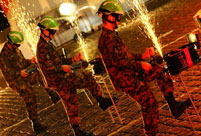 Int'l Military Music Festival kicks off in Moscow
Int'l Military Music Festival kicks off in Moscow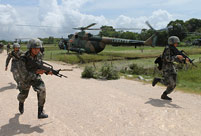 Army aviation brigade in actual-troop drill
Army aviation brigade in actual-troop drill Top 10 Chinese provinces for the well-heeled
Top 10 Chinese provinces for the well-heeled 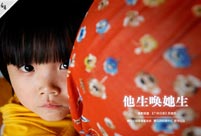 Baby born to save his sister - the story of a savior sibling
Baby born to save his sister - the story of a savior sibling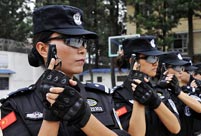 Lady of mystery: Female SWAT team in prison disclosed
Lady of mystery: Female SWAT team in prison disclosed 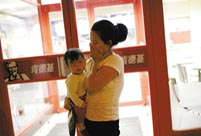 Single mother, baby live in KFC restaurant for months
Single mother, baby live in KFC restaurant for months Fan Bingbing poses for Malaysian magazine Citta Bella
Fan Bingbing poses for Malaysian magazine Citta Bella Zhang Xinyi covers COSMOPOLITAN
Zhang Xinyi covers COSMOPOLITAN A collection of bizarre rooftop buildings around China
A collection of bizarre rooftop buildings around China Egyptian forces step up crackdown campaign on smuggling tunnels
Egyptian forces step up crackdown campaign on smuggling tunnels China, U.S. conduct joint anti-piracy drill
China, U.S. conduct joint anti-piracy drill  'Abandoned' life in cement boats in Huai River
'Abandoned' life in cement boats in Huai River 2013 Taiwan Int'l Tourism Expo kicks off in Taipei
2013 Taiwan Int'l Tourism Expo kicks off in Taipei Photo story: Take a gap year
Photo story: Take a gap year Nokia's Global Headquarters: visiting a declining empire
Nokia's Global Headquarters: visiting a declining empireDay|Week|Month